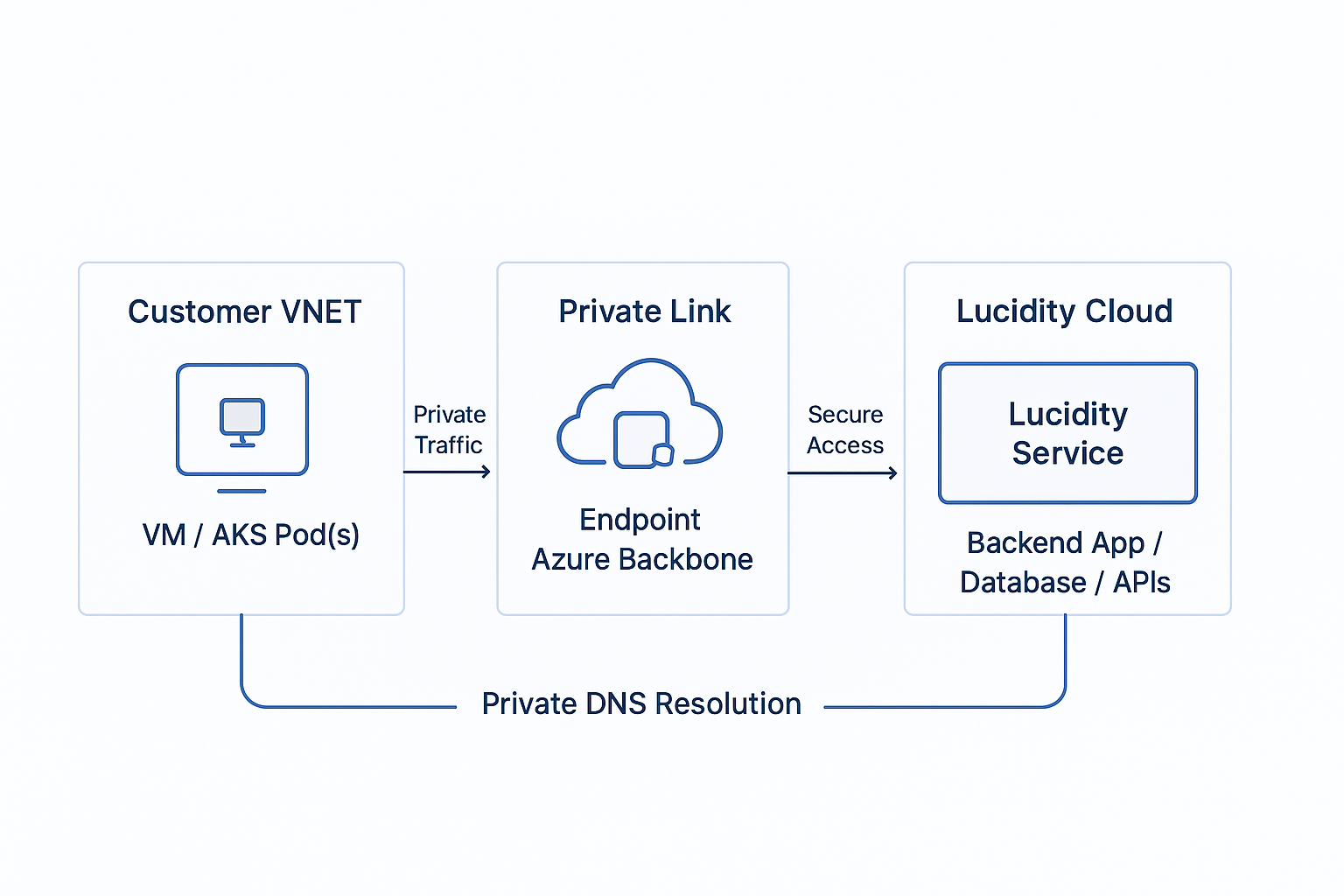Secure by Design: Lucidity Meets Azure Private Link

As organizations accelerate their cloud adoption, the need for secure, private connectivity to critical services has never been greater. Lucidity recognizes this imperative and offers robust support for Azure Private Link Service (PLS), empowering customers to safeguard their data and operations in the cloud—without exposing any internal details or compromising on performance.
What is Azure Private Link Service?
Azure Private Link Service enables private, secure access to Azure Platform as a Service (PaaS), customer-owned, or partner services directly from your virtual network. All traffic remains on the Microsoft backbone network, never traversing the public internet. This architecture delivers enhanced security, compliance, and performance for your cloud workloads.
Key Benefits of Lucidity with Azure PLS
- End-to-End Security: All communication between Lucidity components and your Azure resources can be routed exclusively over private endpoints, ensuring zero exposure to the public internet.
- Compliance-Ready: Lucidity’s architecture supports regulatory requirements such as GDPR, HIPAA, and PCI DSS by providing network isolation and full auditability.
- Performance & Reliability: Leveraging Microsoft’s global network, Lucidity ensures low-latency, high-performance connectivity for storage automation and scaling operations.
- Seamless Integration: Lucidity’s onboarding process is quick and secure, with a one-time setup that aligns with Azure best practices. Customers retain full control over their environment, with Lucidity operating outside the I/O path and never accessing application data.
How Lucidity Enables Private Link Connectivity
High-Level Architecture
Below is a high-level architecture diagram illustrating how Lucidity integrates with Azure PLS:

Flow:
- Customer creates a Private Endpoint in their VNET, referencing the Lucidity PLS alias.
- All communication between the customer’s resources and Lucidity flows privately, never leaving the Azure backbone.
- Private DNS zones ensure seamless name resolution for Lucidity-managed services.
Typical Setup Steps:
- Create a Private Endpoint: Deploy it within the customer's resource group and VNET.
- Provide the PLS Alias: Enter the unique alias provided by Lucidity during the endpoint creation.
- Select VNET/Subnet: Choose the target network and subnet for deployment.
- Approve Connection: Lucidity approves the pending connection in the Private Link Center.
- Configure Private DNS Zone: Create a DNS zone (e.g., privatelink.lucidity.cloud), link it to the VNET, and add DNS records that point to the private endpoint's IP address.
- Test Connectivity: Test and confirm that Lucidity services are accessible privately from within your VNET.
Lucidity is engineered with a security-first mindset:
- No Data Path Access: Lucidity never reads or modifies your application data. Only essential, non-sensitive telemetry is collected for scaling decisions.
- Encrypted Communication: All data in transit and at rest is encrypted, and customers can enforce private network routing via Azure PLS.
- Full Auditability: Every operation is logged and auditable, supporting compliance and transparency.
- Enterprise Support: Lucidity provides 24x7 support and rapid escalation workflows for mission-critical environments.
Best Practices
- Utilize Azure Private DNS Zones for reliable and seamless name resolution.
- Adhere to the principle of least privilege by limiting permissions to only what Lucidity requires.
- Continuously monitor and audit operations using both Azure Activity Logs and Lucidity’s built-in Operational Timeline.
- Leverage VNET peering to extend private connectivity across multiple regions or subscriptions.
- Engage with Lucidity support during onboarding for architecture review and tailored recommendations.
In summary:
Lucidity’s support for Azure Private Link Service empowers organizations to achieve secure, private, and compliant cloud operations—without sacrificing agility or control. By leveraging Azure PLS, Lucidity ensures that your automation, scaling, and storage management workflows remain protected, performant, and fully aligned with industry best practices.



.png)
.png)
.png)

.png)
.png)
.png)
.png)
.png)

















.webp)




























































